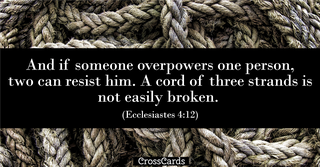
- Recent Translations
- All Translations
Images for Ecclesiastes 4:8

Ecclesiastes 4:8 in Other Translations
Ecclesiastes 4:8 Meaning and Commentary
There is one [alone], and [there is] not a second
According to Aben Ezra, either no friend or companion, or no servant, or no wife, which last sense he prefers; no friend or companion he chooses, because friendship and fellowship lead to expenses; and no servant who would be chargeable to him; and no wife, which would be more expensive, and bring on a family of children; wherefore, to save charges, he chooses to have neither of these; for this is a covetous man who is here desert bed; yea, he hath neither child nor brother;
to inherit his substance, as the Targum adds; some worldly men, whose bellies are filled with hidden treasures, having enjoyed much, when they die, leave the rest of their substance to their babes; but the man here described has no children, nor any relations to leave his wealth unto; yet [is there] no end of all his labour;
when he has executed one scheme to get riches, he forms another; and having finished one work, he enters upon another; he rises early and sits up late, and works and toils night and day, as if he was not worth a dollar, and had a large and numerous family to provide for; or there is no end of what he labours for, or gets by his labour; there is no end of his treasures, ( Isaiah 2:7 ) ; he is immensely rich, so Aben Ezra interprets it; neither is his eye satisfied with riches:
with seeing his bags of gold and silver, though he takes a great deal of sure in looking upon them too, without making use of them; yet he is not satisfied with what he has, he wants more, he enlarges his desire as hell, and like the grave never has enough; see ( Ecclesiastes 5:10 ) ; neither [saith he], for whom do I labour?
having neither wife nor child, nor relation, nor friend, and yet so wretchedly stupid and thoughtless as never once to put this question to himself, Who am I toiling for? I am heaping up riches, and know not who shall gather them; it is a vexation to a worldly man to leave his substance behind him, and even to a man that has an heir to inherit it, when he knows not whether he will be a wise man or a fool; but for a man that has no heir at all, and yet to be toiling and labouring for the world, is gross stupidity, downright madness, and especially when he deprives himself of the comfort of what he is possessed of; and bereave my soul of good?
instead of richly enjoying what is given him, he withholds it from himself, starves his back and belly, lives in pinching want amidst the greatest plenty; has not power to eat of what he has, and his soul desireth; see ( Ecclesiastes 6:2 ) . This [is] also vanity, yea, it [is] a sore travail;
a very vain and wicked thing; "an evil business", as it may be rendered; a very great sin and folly indeed; it is thought by some divines to be the worst species of covetousness, most cruel and unnatural.
Ecclesiastes 4:8 In-Context
Cross References 1
-
1.
Proverbs 27:20